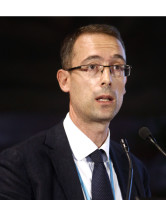Longevity, Ageing and Long-term Care
Healthy Ageing & Longevity
Cellular Ageing
Post-Doctoral Fellowships
Germany
2015.08.31
Healthier Ageing through Better DNA “Spellcheck”
Working with fruit flies, which use a similar enzyme to mammals to ensure mtDNA proofreading, she will assess whether individuals live longer when they accumulate fewer errors. Genetic studies will allow her to search for new molecules that alter the way ageing occurs by increasing or decreasing this enzyme’s activity. By clarifying the link between dysfunctioning mitochondria and ageing, Dr. Baggio hopes to understand better how the process occurs and to reveal fundamentally new targets for the treatment of age-related diseases. The burden of such conditions is huge and increasing every year. Dementia, for instance, affected some 44 million people worldwide in 2014—a number that is expected to triple by 2050. Its estimated cost of $604 billion in 2010 has nowhere to go but up, unless preventative treatments can be found. Dr. Baggio’s research could open doors to new ways of tackling these age-related challenges that are at once medical, economic and societal.
Scientific title: Identification Of Novel Genes Modulating Age-Associated Mitochondrial Dysfunction

Francesca
BAGGIO
Institution
Max Planck Institute for Biology of Ageing
Country
Germany
Nationality
Italian
Related articles
Longevity, Ageing and Long-term Care
Societal Challenges
Demography
Emerging Market
Income & Wealth
Inequality & Poverty
Joint Research Initiative
United States
2018.04.30
Mortality: towards reliable estimates in developing countries
Getting the most out of unreliable data, and actuarial applications Indeed, by attempting to prove that the mortality datasets available... Read more

Magali
BARBIERI
University of California - Berkeley
Longevity, Ageing and Long-term Care
Prevention & Personalised Health
Healthy Ageing & Longevity
Genetics & Omics
Post-Doctoral Fellowship
United Kingdom
2017.06.30
Longevity : do you have the genes for it?
The investigation of ageing genes is a very active topic of research, but a very challenging one. « This kind... Read more

Peter
JOSHI
